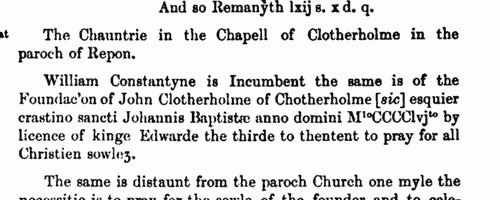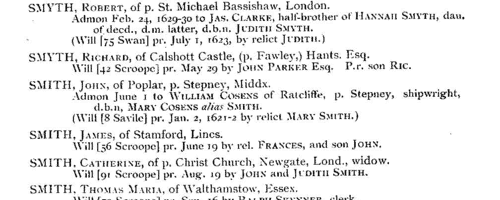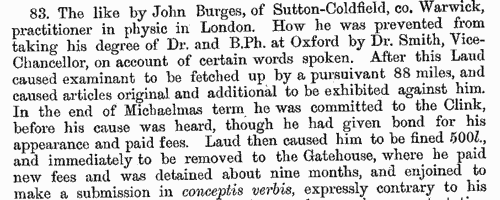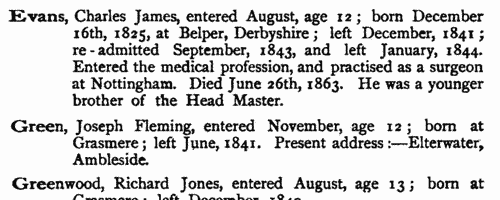Copland Surname Ancestry ResultsOur indexes 1000-1999 include entries for the spelling 'copland'. In the period you have requested, we have the following 394 records (displaying 21 to 30): Single Surname Subscription | | | Buying all 394 results of this search individually would cost £2,282.00. But you can have free access to all 394 records for a year, to view, to save and print, for £100. Save £2,182.00. More... |
These sample scans are from the original record. You will get scans of the full pages or articles where the surname you searched for has been found. Your web browser may prevent the sample windows from opening; in this case please change your browser settings to allow pop-up windows from this site. Yorkshire Feet of Fines
(1571-1584)
Pedes Finium - law suits, or pretended suits, putting on record the ownership of land in YorkshireCOPLAND. Cost: £4.00.  | Sample scan, click to enlarge

| Traders in Canterbury
(1392-1592)
No man or woman could trade in the city of Canterbury without having obtained 'freedom' of the city, unless they paid an annual fee to do so. Admissions of freemen were recorded on the Chamberlains' Accounts of the city, which were prepared annually from Lady Day (25 March) to Lady Day until 1752, and thereafter each set runs from 1 January to 31 December. The accounts for 1392 are incomplete, but thereafter until 1800 there is a complete series except for the years 1455 to 1457 and the year 1552-3. Joseph Meadows Cowper, Honorary Librarian to the Corporation, transcribed and privately printed in 1904 the lists of the Intrantes - those persons, not being free of the city, who paid the annual fine to trade - for the period 1392 to 1592. The names are arranged by ward (Burgate, Newyngate, Westgate, Worgate and Northgate, and give full name, (sometimes) occupation, and fee paid. COPLAND. Cost: £4.00.  | Sample scan, click to enlarge

| Scottish litigants, rebels and cautioners
(1585-1592)
The Privy Council of Scotland exercised a superior judicial authority in the kingdom, and consequently received and dealt with a constant stream of petitions, as well as dealing with the internal security of the state. This register of the council from 1 August 1585 to 31 July 1592, in the reign of king James VI, was edited by David Masson, and published under the direction of the Lord Clerk Register of Scotland in 1881. Some of the individuals mentioned are the complainants, those of whom they complained, and the sureties on both sides: at this period, some of the complainants are alleging serious attacks, often of a feuding nature. Many of the bonds entered into by the cautioners are promises to keep the peace towards such enemies. Failure to answer to the council when summoned was a serious contempt, leading to being denounced a rebel, with serious consequences. But 'horning' was also used in the pursuit of debts: there was no imprisonment for debt in Scotland, but a creditor could have an obstinate debtor ordered, in the sovereign's name, to pay what was due, failing which, the debtor could be put to the horn, denounced as a rebel, and imprisoned as a rebel. The main text (to page 774) is from the Acta Secreti Concilii, containing the minutes of the Privy Council, with intermixed Acta Proper (political edicts), Decreta (judicial decisions), Acta Cautionis (acts of caution) and Bands (registration of bonds). After that are printed some miscellaneous Privy Council documents from the same years: additional acts of caution (775-778); ordinances and acts anent the Borders and the North (779-814); and miscellaneous privy council papers (815-834). The sources most productive of names, the Acta Cautionis and Registration of Bands, are also the most repetitive in form, and are not transcribed verbatim and literatim: nevertheless, one of the editor's rules was for 'All proper names and names of places occurring in the originals to be preserved in the abstracts without exception, and in the exact original spelling.'
COPLAND. Cost: £4.00.  | Sample scan, click to enlarge

| Scottish litigants, rebels and cautioners
(1592-1599)
The Privy Council of Scotland exercised a superior judicial authority in the kingdom, and consequently received and dealt with a constant stream of petitions, as well as dealing with the internal security of the state. This register of the council from August 1592 to May 1599, in the reign of king James VI, was edited by David Masson and published under the direction of the Deputy Clerk Register of Scotland in 1882. The publication brings together the contents of the principal register (Acta Secreti Concilii) with acts and bands (bonds) of caution (surety) from the registers called Acta Cautionis (pp 561-730); Acts and Ordinances relating to the Borders and the North (731-748); and Miscellaneous Privy Council Papers (749-769). Many of the individuals mentioned are the complainants, those of whom they complained, and the sureties on both sides: at this period, many of the complainants are alleging serious attacks, often of a feuding nature. Many of the bonds entered into by the cautioners are promises to keep the peace towards such enemies. Failure to answer to the council when summoned was a serious contempt, leading to being denounced a rebel, with serious consequences.
COPLAND. Cost: £4.00.  | Sample scan, click to enlarge

| Inhabitants of Ripon
(1354-1609)
In 1888 the Surtees Society published, as the 3rd volume of Memorials of the Church of SS Peter and Wilfrid, Ripon, a collection of extracts from a variety of sources relating to the minster - a copy of the appropriate section from the Valor Ecclesiasticus of 1535-6; chantry certificates of 1546-7; ministers' accounts of 1547-9; fabric rolls (giving accounts of expenditure on the buildings) from 1354 to 1542; a paper book of about 1520; treasurers' rolls from 1401 to 1485; chamberlains' rolls from 1410 to 1558; an inquisition of 1609 (from the Duchy of Lancaster archives); and extracts from the diocesan archives of 1567 to 1580. The people that appear in these records are not only the clergy, but also workmen maintaining and repairing the fabric, local tenants, and the names of the deceased whose obits incurred small payments to the church.COPLAND. Cost: £4.00.  | Sample scan, click to enlarge

| London Marriage Allegations
(1521-1610)
London, Essex and part of Hertfordshire lay within the diocese of London. In the later 17th century the individual archdeaconry courts issued marriage licences, but for this period the only surviving material is from the overarching London Consistory court. The main series of marriage allegations from the consistory court starts 7 December 1597, and these were extracted by Colonel Joseph Lemuel Chester; Colonel Chester then discovered earlier material, back to 5 January 1521, in Vicar-General's Books of the Principal Probate Registry. The notices in these books were much briefer, but as well as extending back so much earlier, they included additional material for 1597 onwards. All this he collated with the consistory court extracts, and the text was edited by George J. Armytage and published by the Harleian Society in 1887. A typical later entry will give date; name, address and occupation of groom; name, address and condition of his intended bride, and/or, where she is a spinster, her father's name, address and occupation. Lastly we have the name of the church where the wedding was going to take place; or the words Gen. Lic. signifying a general or open licence.COPLAND. Cost: £4.00.  | Sample scan, click to enlarge

| PCC Probate Abstracts
(1630-1634)
The Prerogative Court of Canterbury's main jurisdiction was central and southern England and Wales, as well as over sailors &c dying abroad: these brief abstracts usually give address, date of probate and name of executor or administrator
COPLAND. Cost: £2.00.  | Sample scan, click to enlarge

| PCC Probates and Administrations
(1634)
The Prerogative Court of Canterbury's main jurisdiction was central and southern England and Wales, as well as over sailors &c dying abroad: these brief abstracts, compiled under the title "Year Books of Probates", and printed in 1902, usually give address, date of probate and name of executor or administrator. They are based on the Probate Act Books, cross-checked with the original wills, from which additional details are, occasionally, added. The original spelling of surnames was retained, but christian and place names have been modernised where necessary.COPLAND. Cost: £2.00.  | Sample scan, click to enlarge

| Official Papers
(1641-1643)
The State Papers Domestic cover all manner of business relating to Britain, Ireland and the colonies, conducted in the office of the Secretary of State as well as other miscellaneous records. These records are from June 1641 to December 1643: there is also a set of abstracts of navy correspondence.
COPLAND. Cost: £4.00.  | Sample scan, click to enlarge

| Boys entering Sedbergh School
(1640-1648)
B. Wilson prepared this edition of the register of the Grammar School at Sedbergh in the West Riding of Yorkshire, published in 1895. Sedbergh school had three exhibitions at St John's College, Cambridge, and for the earliest years little more could be found about the pupils at the school than was recorded at St John's or other colleges. In 1700-1706 the first material from Sedbergh appears, but no more than lists of surnames. From 1746 onwards full names, or surnames and initials, are found for those boys who did not continue to university. It is only from 1820 onwards that the school register starts to give detail: month of entry, age, birthplace, and month of leaving. From then onwards Wilson was able to add more and more biographical detail, except, of course, for those boys in 1895 still at the school or with their careers yet ahead of them.COPLAND. Cost: £4.00.  | Sample scan, click to enlarge

|
Research your ancestry, family history, genealogy and one-name study by direct access to original records and archives indexed by surname.
|












